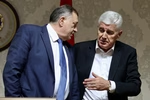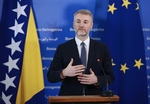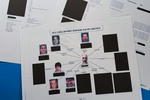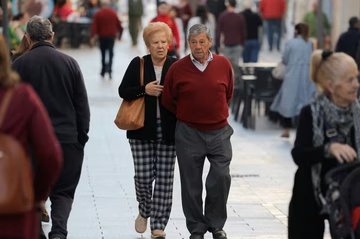Bosnia's Ambassador to USA: Vote on Srebrenica Resolution will show how much IC supports Bosnia

The final text of the resolution on the Srebrenica genocide, which will be voted on before the UN General Assembly, has been finalized. The voting date is approaching, but on May 15, a regular session on the state of Bosnia and Herzegovina will be held at the UN Security Council. Sven Alkalaj, the Ambassador of Bosnia and Herzegovina to the USA and former ambassador to the UN, spoke to N1 from Washington.
When asked if there has been a "delay in voting on the resolution," as some have claimed, Alkalaj responded:
"They're waiting for people from Germany and Rwanda to return from certain conferences, so we expect to have the exact voting date for the Srebrenica Genocide Resolution on Monday," Alkalaj said, adding:
"Nothing significant has changed from the original text that was published. The key term indicating that a genocide occurred in Srebrenica in 1995 remains intact. What happened yesterday is that Serbia sent a letter requesting the withdrawal of the draft resolution on genocide and to return the entire process to the beginning."
"Our mission quickly responded and refuted all the arguments presented in Serbia's letter. I don't think anything will change in the text apart from what has been finalized," Alkalaj said.
Alkalaj noted that Serbia is desperately trying to stop an inevitable process.
"This is a desperate attempt by Serbia to halt a process that is unavoidable. It might be delayed by 2-5 days, but significant changes, such as returning to the beginning or reaching regional consensus, are impossible."
"It's impossible to stop a process that has gained momentum. Fifty-seven countries have given their full support, so I believe the process is on track, and a delay of 2.5 or 7 days won't change anything," Alkalaj stated.
Resolution's text aimed at reconciliation
Alkalaj emphasized that the text of the resolution is intended for reconciliation.
"What all countries emphasize is that the resolution's text is created for reconciliation, to finally give identity and respect to the judgments, allowing the commemoration of the genocide in such a significant organization.
This will be a step towards further reconciliation, putting an end to this issue. The judgments and facts where more than 8,000 people were killed are not up for discussion. On the other hand, the goal is to prevent the glorification of war criminals who freely reside in Serbia."
On Ivica Dacic's comments about reverting to the beginning, Alkalaj remarked:
"Ivica Dacic's comment is shameful. International court rulings that have been made cannot be denied, and this must end. Bosnia and Herzegovina has passed a law banning genocide denial. We're trying to bring Serbia to a catharsis and accept the fact. This nationalism brings nothing good to Serbia or the region."
Alkalaj was asked if the Resolution will slow down the European path, and he replied:
"It won't slow us down on the European path; we're already late, disorganized in our country. What we need now is to start the process within ourselves. The global situation is quite unstable, and if we wait for further moments, after the aggression on Ukraine, COVID-19, and everything else, I support moving forward with adopting the resolution."
"The vote will show how much the international community supports Bosnia and Herzegovina. This is a serious signal. We need to organize and move forward within the country. A quicker move towards the EU will undoubtedly improve certain aspects, prevent the exodus of young people, and help Bosnia and Herzegovina," Alkalaj concluded.
Kakvo je tvoje mišljenje o ovome?
Učestvuj u diskusiji ili pročitaj komentare





 Srbija
Srbija
 Hrvatska
Hrvatska
 Slovenija
Slovenija



























































